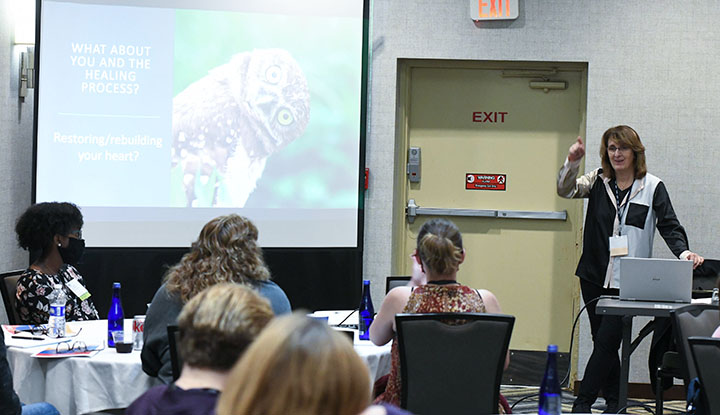“I have answers — but I don’t do it. I give great advice — but I don’t take it,” Marie Pelzer, United Federation of Teachers, shared with a roomful of colleagues.
They were all searching for ways to take care of their own social emotional health at NYSUT’s recent School-Related Professionals conference.
SRPs were recognized as Super Heroes Nov. 16, the annual recognition day in New York state, the third Tuesday in November.
At the conference, they learned that even heroes need to help themselves.
“A hero is an ordinary individual who finds the strength to persevere and endure in spite of overwhelming obstacles.” — Christopher Reeve
Stress and trauma impact the entire body, said workshop presenter Mary Moller, LMSW, CAS. In her PowerPoint, she showed an MRI that revealed orange slashes splaying throughout a body — cortisol racing through the system in response to stress. Excess cortisol can generate hostility, hunger, migraines, acid reflux, hypertension, depression, and decreased immunity.
SRPs have many new duties as a result of the COVID-19 pandemic. Now, more than ever, these staff members are relied on to make and deliver food to families in need, to learn and apply new sanitation techniques, to help students and teachers with new technology, to deal with radical shortages of bus drivers and revise their working schedule, and to assist students struggling with a changed world.
Their own situations at home have changed as they have had to help children and grandchildren with at-home learning when schools close because of the pandemic.
Moller spelled it out simply: Give yourself permission for self care. Give yourself permission to ask for help. Give yourself permission to accept all your feelings.

Mary Moller presents at the NYSUT SRP Leadership Conference. Photo by Andrew Watson.
She urged SRPs to carve out even 15 minutes a day and asked them what they would do with that time.
Sleep. Read. Walk, they said. Do Nothing. Listen to music. Spend time with pets. Be out in nature. Drink water. Meditate. Watch a funny show or read comics: laugh. Find a safe place and do a relaxing visualization. Sit in your car and look outside at the trees. Make a cup of tea. Breathe deeply.
Turn off your phone. That refrain was heard again and again: the importance of shutting off the phone during self-care breaks.
Taking regular breaks interrupts the stress response to replace it with calm.
Lack of self care results in compassion fatigue, Moller said. Burnout can manifest depersonalization and reduced personal accomplishment. Contributions to burnout include low salaries, demanding schedules, low recognition, lack of resources, and lack of clear definitions and support for duties.
Developing social support, setting boundaries, developing a spiritual connection, and reaching out for professional help are protective factors that can help people cope and grow, Moller explained.